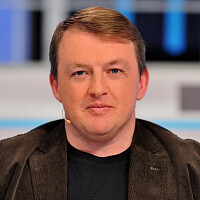There is hell in Donbas. With daily news that I wish I didn't hear. With news that turns stubborn optimists into the same stubborn pessimists, swinging on an emotional seesaw enhanced by unjustified high expectations created by Ukrainians with their own hands.
At the same time, voices are being raised, from Kissinger to Peskov, who are urging Ukraine to sign peace and recognize the status quo as soon as possible. They are echoed by the dwarf alcoholic Medvedev, attacking both Ukraine and the German chancellor who declared that there should be no Russian-foisted peace.
It seems like a rough patch that is infinitely long. It seems that there is no light. It seems that the world is ready to abandon Ukraine.
But stop! Do you see anything strange? Amid the successes at the front, local successes in Donbas, the Russians are struggling to force Ukraine to negotiate. But why? Why now, when they are successful? Why do they suddenly want peace? When did Russia stop of its own accord? Usually, the world made Putin negotiate by the force of sanctions threats.
Paradox, right? No, on the contrary. Russia, having concentrated all its forces, threw them to one destination in Donbas. And achieves local success in Donbas. And wants to negotiate right now. Because now they have a position of strength. Right now they are not yet completely exhausted. And they want to anchor achievements. To anchor them amid emotions of victories, albeit local ones.
What does it mean? They understand that they are at their peak. And that the coming weeks will bring them their utmost. To do this, you need to be anchored. And that is why they need to galvanize all our friends so that a peace agreement can be reached right now. Before the weapons arrive. Before the "structural transformation" of the Russian economy began, which they themselves appointed for the end Q2.
And we hear voices about the need to agree. The need to save face.
And about the outside world. Kissinger is not the whole world. And it was for a reason that the lobbying company associated with him helped promote Nord Stream 2. That is why he is not an accidental sage. We may be displeased with Germany and France, but Medvedev's rhetoric suggests that Moscow is much more frustrated. Not to mention the inflexible position of Britain and the States.
Even before, the voices of Putin's friends called on Ukraine to capitulate. And now they are calling not to beat Putin hard so that he saves face. Dynamics is positive.
Does this mean that Ukraine will definitely win? No. But this means that even the enemies do not see their strategic victory. And they do everything to save their face. And it's natural that they try to do it. Naturally, they step up their assets and spend all their resources. It would be strange if they didn't.
Does the enemy still have some strength left? Yes, because they put everything on the line in the operation in Donbas. And they will keep pressing. But we must remember that war is a marathon. War is a long game. And just as we rejoiced at the victories near Kyiv and Kharkov, so we will suffer because of the defeats in Donbas. But this is not the end of the game. This is just one of the episodes. Terrible? Yes. Cruel? Yes. But war itself is terrible and cruel, war is the worst thing that can happen to a country. War is the worst thing that can happen in a person's life. And it has already happened.
Text published with the consent of the author
The editors are not responsible for the content of the material and may not support the opinion of its author














